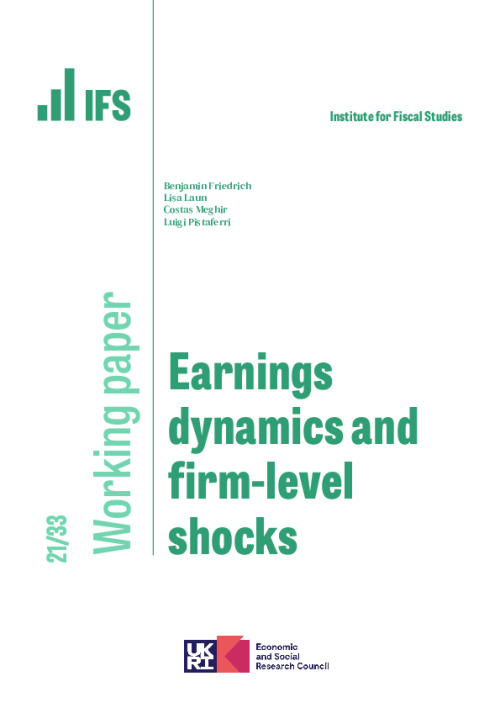Downloads

WP202133-Earnings-dynamics-and-firm-level-shocks.pdf
PDF | 928.59 KB
We use matched employer-employee data from Sweden to study the role of the firm in affecting the stochastic properties of wages. Our model accounts for endogenous participation and mobility decisions. We find that firm-specific permanent productivity shocks transmit to individual wages, but the effect is mostly concentrated among the high-skilled workers. For low-skilled the pass-through is similar for temporary and permanent firm-level shocks and the magnitude smaller. The updates to worker-firm specific match effects over the life of a firm-worker relationship are small. Substantial growth in earnings variance over the life cycle for high-skilled workers is driven by firms. In particular, cross-sectional wage variances by age 55 are roughly one-third higher relative to a scenario with no pass-through of firm shocks onto wages.
Authors

Research Fellow Yale University
Costas is a Research Fellow of the IFS and a Professor of Economics at Yale University and a Visiting Professor at University College London.

Stanford University

Lisa Laun

Benjamin Friedrich
Working Paper details
- DOI
- 10.1920/wp.ifs.2021.3321
- Publisher
- Institute for Fiscal Studies
Suggested citation
Friedrich, B et al. (2021). Earnings dynamics and firm-level shocks. London: Institute for Fiscal Studies. Available at: https://ifs.org.uk/publications/earnings-dynamics-and-firm-level-shocks (accessed: 30 June 2024).
More from IFS
Understand this issue

If you can’t see it, you can’t be it: role models influence female junior doctors’ choice of medical specialty
24 April 2024

Sure Start achieved its aims, then we threw it away
15 April 2024

Behind the numbers: reassessing investment in skills and training
12 October 2023
Policy analysis

How do the last five years measure up on levelling up?
19 June 2024

The Conservatives and the Economy, 2010–24
3 June 2024

A decade and a half of historically poor growth has taken its toll
3 June 2024
Academic research

The impact of labour demand shocks when occupational labour supplies are heterogeneous
28 June 2024

Labour market inequality and the changing life cycle profile of male and female wages
15 April 2024

Interpreting cohort profiles of lifecycle earnings volatility
15 April 2024